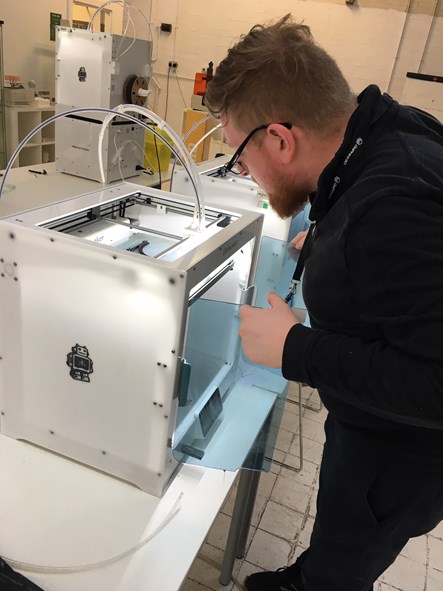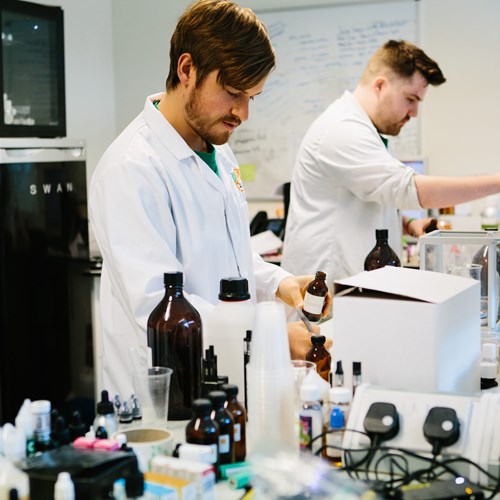The power of collaboration post-COVID
11 May 2020
Collaboration in the manufacturing sector has never been so important. Manufacturing advisor Geoff Crossley explains the benefits that can be gained from co-operating with peers, neighbours and other experts, and outlines how to go about getting started.
A new normal
We’ve entered unprecedented territory in recent weeks, and though the end is not yet in sight, we’ve already learned some heart-warming lessons about what our sector can achieve when we work together.
No manufacturer has been left untouched by the COVID-19 pandemic, whether it’s a collapse in demand for some, skyrocketing demand for others, supply chain disruption or responding to social distancing requirements. Businesses have been driven by necessity to co-operate in new and creative ways, to remarkable effect. The way the manufacturing community has come together so rapidly to produce critical supplies for the NHS shows we can achieve extraordinary things through collaboration.
Once the dust settles, we’ll be able to look back on this experience as proof that collaboration is a powerful tool that will help us navigate through other shared challenges like changing consumer behaviour, EU exit or the looming climate crisis. The benefits of exchanging information, networks and expertise with peers can include not only new commercial opportunities but also lower costs, improved corporate reputation and increased resilience. Lots of companies will come out of the current crisis with a much closer customer and supplier relationships, which will put them in good stead for the future.
“Networking and seeking local and international companies with core competencies to partner with is vital. I have enjoyed the past few weeks working from home researching, networking and developing opportunities for when lockdown is over. All businesses have learnt a lot about themselves.”
Richard Hagan, Director of Rochdale manufacturer Crystal Doors
Here are just a few examples of scenarios where collaboration can be beneficial:
1. Sharing best practice
Over the last few years, I have been working with a small group of companies who all supply into the automotive sector. They aren’t direct competitors, so we facilitated a meeting so that they could share expertise, visit each other’s factories and learn from each other’s experience. As any MD of a small manufacturer will tell you, it can be a lonely job, so any opportunity to learn from others in your industry should be grabbed with both hands.
2. Sharing assets and materials
Most manufacturers live on large industrial estates but, despite the huge diversity of activity on their doorstep, they often have little contact with their neighbours. At the very least, this is a missed opportunity to reduce costs by sharing useful assets such as machinery or warehouse capacity. I’ve seen a great example of this on an estate in Horwich, where a company offers its forklift truck ramp as a rentable shared asset across the estate.
Neighbours can even find new uses for each other’s waste material. In Trafford Park for example, rejected cornflakes from Kellogg’s are being used as a raw ingredient by nearby brewery Seven Bro7hers. There’s something we can all drink to!


3. Micro networks
There are also good examples of companies working together for common advantage, for example in negotiations with landlords or the pooling of resources to expand into new markets. In one example I know of, a group of neighbouring companies, who had recognised a synergy between them, established an informal arrangement to submit joint bids for contracts that they wouldn’t otherwise have been able to tender for.
We are currently developing several micro networks to help businesses with non-competitive similarities find solutions and opportunities during the Coronavirus crisis. Each network brings together a small number of manufacturers, who meet via Zoom to discuss their most pressing challenges and share learning.
4. Buyers’ consortia
A slightly more formal approach to collaboration is using the power of collective bargaining to bring down prices on materials, products or utilities. A good local example is Greater Manchester Solar Together – a group-buying scheme set up by the Greater Manchester Combined Authority to help homeowners and businesses purchase solar panels at a more competitive price.
5. Knowledge transfer
Formal arrangements to access specialist skills or R&D expertise, such as Knowledge Transfer Partnerships (KTPs), are one of the more obvious examples of collaboration between organisations. GC Business Growth Hub’s partnership with Greater Manchester’s four universities and help with Innovation Vouchers makes us a great portal for these opportunities. For example, we’ve helped Trafford-based M&I Materials team up with scientists at Manchester Metropolitan University to provide new analytical insight into the ceramic disks they manufacture. In Rochdale, we helped GJD Manufacturing secure grant funding for a KTP to develop new technology with the same university. More recently we also connected MMU’s PrintCity with Merc Aerospace. Working in partnership with the Hub’s Innovation team, we arranged for the transfer of 3D object File and 3D Printer Settings to enable Merc to manufacture 3D printed face shield main head band mask components. As a result, vital mask components were delivered to the NHS within days.
The rise of digital technology and servitisation in modern manufacturing makes knowledge transfer all the more important. It can be hard to know how to get started with digitalisation or service innovation on your own, so build relationships with market disruptors and niche experts. One way to do this is to join Made Smarter, which offers student placements to bring the latest digital skills and insight into your business. You don’t necessarily need to take the academic route though – knowledge transfer can be B2B as well.

Become a better leader
As well as opening up new commercial opportunities, collaboration can also make you a better leader. When we bring SMEs together at roundtables, they’re always surprised by how much they end up learning from each other. No matter what your dilemma is, the chances are someone else has already been through it, so surrounding yourself with peers who can speak from experience is invaluable.
For a more private, one-to-one collaborative relationship with a successful business leader, our Mentoring for Growth programme can open the door to some of the most successful manufacturers in the North West – including Siemens, BAE Systems and GSK.
Nurture your network
Of course, collaboration isn’t straightforward. It requires strong relationships, long-term co-operation and mutual trust, not to mention clear agreements on things like liability and IP. It also requires nurturing – promising early conversations can often fizzle out if lines of communications aren’t left open. That’s where we can help. One of our strengths as manufacturing advisors is the ability to act as a ‘fixer’ to bring like-minded companies together and facilitate ongoing discussion.
Don’t hesitate to get in touch if you think you could benefit from joining one of our micro networks for support during the current crisis. We also have a growing number of potential collaborators waiting for you in our online Manufacturing Directory. The power of collaboration is just a few clicks away!
Join our Manufacturing Network
You may also like...

Geoff Crossley, Senior Manufacturing Advisor
Geoff is a highly skilled manufacturing specialist, practiced in supporting manufacturing businesses to implement lean tools and techniques which will increase efficiency. Geoff is passionate about helping manufacturers work smarter and to do more with less.
With a background in engineering design and experience running a successful business, Geoff is skilled at strategic planning, developing sales and marketing strategies to generate new customers and delivering sustained profitability.
To view Geoff's full profile including technical capabilities and industry experience, please click here.

